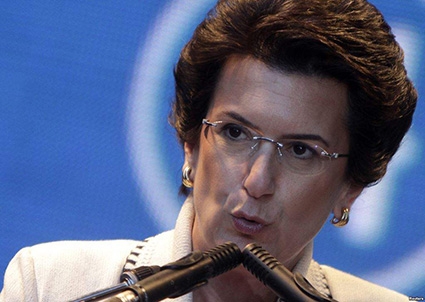Burjanadze’s Russian Roulette
Nino Burjanadze, leader of the Democratic Movement, left for Moscow on July 10 upon the invitation of Russian State Duma Speaker Sergei Naryshkin.
Despite the adversarial relations between Georgia and Russia since 2008 and Russia’s occupation of over 20 percent of Georgia’s territory, Burjanadze was to participate in a round table called “World and regional security challenges of the 21st century” organized by Russia’s Foreign Ministry (MFA).
Some questioned the credibility of Russia organizing such meetings, when it itself represents one of the main challenges to international law in the region. Burjanadze, who is widely criticized in Georgia for being anti-western and therefore perceived as pro-Russian, held high-level meetings in the Federation Council and the Russian MFA.
“If we restore confidence with Abkhazians and Ossetians and Russia fulfills a positive role, we will regulate the conflict,” stated Burjanadze in her interview with NTV, the Putin-affiliated media source in Russia.
Details of Burjanadze’s meeting with Naryshkin were not revealed publicly with the Georgian policitian simply admitting that “painful issues were discussed.”
Burjanadze also stated that NATO integration is unrealistic for Georgia adding “Georgia should be a western-type, democratic country but it does not mean it should be a member of any certain organization to do so.”
“We should realize that nobody is waiting for us in NATO. NATO integration is unrealistic,” she added.
Senior experts and Georgian citizens have been heavily critical of Burjanadze’s visit with many even considering it a clear admission of Burjanadze’s role in Russia’s ideological so-called “fifth column”. After openly stating her Russian aspirations in 2007 and attempting a coup against the legitimate government, Burjanadze was targeted by then President Saakashvili who aimed to limit her activities.
In spite of Russia’s occupation of territories in Georgia and Ukraine, Burjanadze insists that “the attitude of the Georgian people is gradually changing and more and more Georgians do not perceive Russia as their enemy.”
Being given more airtime than she would ever likely receive in her home country, Russian news outlets reported that Burjanadze perceives Georgian reformers’ involvement in Ukraine’s modernization processes as “humiliation by Ukraine’s government, which slapped Georgia in the face by appointing its former officials to the Ukrainian government.”
Upon her return to Georgia, Burjanadze’s already ailing political credence is unlikely to have been boosted by the Moscow visit unless her assertion of growing sympathy towards a Russian, rather than a European, path among Georgian citizens is accurate.
With very little to lose, Burjanadze can afford the gamble.
Zviad Adzinbaia












